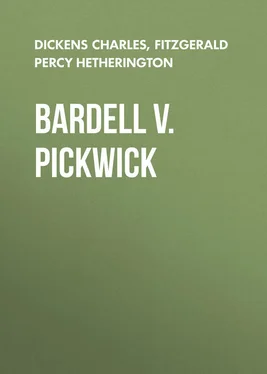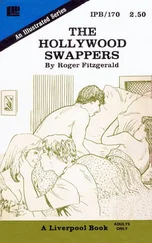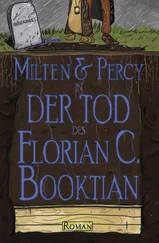Percy Fitzgerald - Bardell v. Pickwick
Здесь есть возможность читать онлайн «Percy Fitzgerald - Bardell v. Pickwick» — ознакомительный отрывок электронной книги совершенно бесплатно, а после прочтения отрывка купить полную версию. В некоторых случаях можно слушать аудио, скачать через торрент в формате fb2 и присутствует краткое содержание. Жанр: foreign_antique, foreign_prose, на английском языке. Описание произведения, (предисловие) а так же отзывы посетителей доступны на портале библиотеки ЛибКат.
- Название:Bardell v. Pickwick
- Автор:
- Жанр:
- Год:неизвестен
- ISBN:нет данных
- Рейтинг книги:4 / 5. Голосов: 1
-
Избранное:Добавить в избранное
- Отзывы:
-
Ваша оценка:
- 80
- 1
- 2
- 3
- 4
- 5
Bardell v. Pickwick: краткое содержание, описание и аннотация
Предлагаем к чтению аннотацию, описание, краткое содержание или предисловие (зависит от того, что написал сам автор книги «Bardell v. Pickwick»). Если вы не нашли необходимую информацию о книге — напишите в комментариях, мы постараемся отыскать её.
Bardell v. Pickwick — читать онлайн ознакомительный отрывок
Ниже представлен текст книги, разбитый по страницам. Система сохранения места последней прочитанной страницы, позволяет с удобством читать онлайн бесплатно книгу «Bardell v. Pickwick», без необходимости каждый раз заново искать на чём Вы остановились. Поставьте закладку, и сможете в любой момент перейти на страницу, на которой закончили чтение.
Интервал:
Закладка:
The Serjeant was writing when his clients entered; he bowed abstractedly when Mr. Pickwick was introduced by his solicitor; and then, motioning them to a seat, put his pen carefully in the inkstand, nursed his left leg, and waited to be spoken to.
‘Mr. Pickwick is the defendant in Bardell and Pickwick, Serjeant Snubbin,’ said Perker.
‘I am retained in that, am I?’ said the Serjeant.
‘You are, Sir,’ replied Perker.
The Serjeant nodded his head, and waited for something else.
‘Mr. Pickwick was anxious to call upon you, Serjeant Snubbin,’ said Perker, ‘to state to you, before you entered upon the case, that he denies there being any ground or pretence whatever for the action against him; and that unless he came into court with clean hands, and without the most conscientious conviction that he was right in resisting the plaintiff’s demand, he would not be there at all. I believe I state your views correctly; do I not, my dear Sir?’ said the little man, turning to Mr. Pickwick.
‘Quite so,’ replied that gentleman.
Mr. Serjeant Snubbin unfolded his glasses, raised them to his eyes; and, after looking at Mr. Pickwick for a few seconds with great curiosity, turned to Mr. Perker, and said, smiling slightly as he spoke —
‘Has Mr. Pickwick a strong case?’
The attorney shrugged his shoulders.
‘Do you purpose calling witnesses?’
‘No.’
The smile on the Serjeant’s countenance became more defined; he rocked his leg with increased violence, and, throwing himself back in his easy-chair, coughed dubiously.
These tokens of the Serjeant’s presentiments on the subject, slight as they were, were not lost on Mr. Pickwick. He settled the spectacles, through which he had attentively regarded such demonstrations of the barrister’s feeling as he had permitted himself to exhibit, more firmly on his nose; and said with great energy, and in utter disregard of all Mr. Perker’s admonitory winkings and frownings —
‘My wishing to wait upon you for such a purpose as this, Sir, appears, I have no doubt, to a gentleman who sees so much of these matters as you must necessarily do, a very extraordinary circumstance.’
The Serjeant tried to look gravely at the fire, but the smile came back again.
‘Gentlemen of your profession, Sir,’ continued Mr. Pickwick, ‘see the worst side of human nature – all its disputes, all its ill-will and bad blood, rise up before you. You know from your experience of juries (I mean no disparagement to you or them) how much depends upon effect ; and you are apt to attribute to others, a desire to use, for purposes of deception and self-interest, the very instruments which you, in pure honesty and honour of purpose, and with a laudable desire to do your utmost for your client, know the temper and worth of so well, from constantly employing them yourselves. I really believe that to this circumstance may be attributed the vulgar but very general notion of your being, as a body, suspicious, distrustful, and over-cautious. Conscious as I am, Sir, of the disadvantage of making such a declaration to you, under such circumstances, I have come here, because I wish you distinctly to understand, as my friend Mr. Perker has said, that I am innocent of the falsehood laid to my charge; and although I am very well aware of the inestimable value of your assistance, Sir, I must beg to add, that unless you sincerely believe this, I would rather be deprived of the aid of your talents than have the advantage of them.’
Long before the close of this address, which we are bound to say was of a very prosy character for Mr. Pickwick, the Serjeant had relapsed into a state of abstraction.
Now the Serjeant might at once have replied to all this, that the innocence or guilt of a client had nothing to do with him, that his use was merely to secure a client such benefit and advantage as the law entitled him to: that a judge and jury would decide the point of innocence. Boz himself evidently shared this popular delusion, and seems to be speaking by Mr. Pickwick’s mouth. The sagacious Serjeant, however, took no notice whatever of the appeal, but simply asked “who was with him” in the case. Mr. Phunky was sent for, and asked by his leader “to take Mr. Pickwick away” and “hear anything he may wish to communicate.” The party was then bowed out.
The truth was, Mr. Pickwick’s attorney was too much of a social character and of the “old family solicitor” pattern for so critical a case. The counsel he “instructed” were unsuitable. Serjeant Snubbin was an overworked “Chamber lawyer,” whose whole time and experience was given to furnishing “opinions” on tangled cases; so pressed was he that he took “expedition fees” to give certain cases priority: an illegitimate practice that now the Bar Committee would scarcely tolerate. What could such a man know of nisi prius trials, of cross-examining or handling witnesses? It is enough to give his portrait, as supplied by the author:
Mr. Serjeant Snubbin was a lantern-faced, sallow-complexioned man, of about five-and-forty, or – as the novels say – he might be fifty. He had that dull-looking boiled eye which is often to be seen in the heads of people who have applied themselves during many years to a weary and laborious course of study; and which would have been sufficient, without the additional eye-glass which dangled from a broad black riband round his neck, to warn a stranger that he was very near-sighted. His hair was thin and weak, which was partly attributable to his having never devoted much time to its arrangement, and partly to his having worn for five-and-twenty years the forsenic wig which hung on a block beside him. The marks of hair powder on his coat collar, and the ill-washed and worse tied white neckerchief round his throat, showed that he had not found leisure since he left the court to make any alteration in his dress: while the slovenly style of the remainder of his costume warranted the inference that his personal appearance would not have been very much improved if he had. Books of practice, heaps of papers, and opened letters, were scattered over the table, without any attempt at order or arrangement; the furniture of the room was old and ricketty; the doors of the bookcase were rotting in their hinges; the dust flew out from the carpet in little clouds at every step; the blinds were yellow with age and dirt; the state of everything in the room showed, with a clearness not to be mistaken, that Mr. Serjeant Snubbin was far too much occupied with his professional pursuits to take any great heed or regard of his personal comforts.
It was a characteristic feature of the slowness of legal process in those days that though the notice of action was sent on August the 28th, 1827, the case was not ripe for trial until February 14th of the next year – nearly six months having elapsed. It is difficult to speculate as to what this long delay was owing. There were only two witnesses whose evidence had to be briefed – Mrs. Cluppins and Mrs. Sanders – and they were at hand. It is odd, by the way, that they did not think of examining little Tommy Bardell, the only one who actually witnessed the proceeding. True, he was of tender years – about eight or ten – and the son of the Plaintiff, but he must have “known the nature of an oath.”
THE TRIAL
At last the momentous morning came round. It was the fourteenth of February, Valentine’s Day, 1828 – one not of good omen for the Plaintiff. 1 1 So confused is the chronology of Pickwick , that it is difficult to fix the exact date of the Trial. Boz, writing some ten years after the event, seems to have got a little confused and uncertain as to the exact year of the Trial. He first fixed the opening of the story in 1817: but on coming to the compromising incident in Goswell Street, which occurred only a few weeks later, he changed the year to 1827. Then Jingle’s anachronism of the French Revolution of July suggested that the new date would not do. So 1830 was next adopted. But this did not end the matter, for in the “errata” we are directed to change this date back again to 1827. And so it now stands. The Trial therefore really took place on April 1, 1828.
The Defendant’s party was rather gloomy at breakfast, when Perker, by wave of encouraging his client, uttered some dicta as to the chances of the Jury having had a good breakfast “Discontented or hungry jurymen, my dear Sir, always find for the Plaintiff.” “Bless my heart,” said Mr. Pickwick, looking very blank, “What do they do that for!”
Интервал:
Закладка:
Похожие книги на «Bardell v. Pickwick»
Представляем Вашему вниманию похожие книги на «Bardell v. Pickwick» списком для выбора. Мы отобрали схожую по названию и смыслу литературу в надежде предоставить читателям больше вариантов отыскать новые, интересные, ещё непрочитанные произведения.
Обсуждение, отзывы о книге «Bardell v. Pickwick» и просто собственные мнения читателей. Оставьте ваши комментарии, напишите, что Вы думаете о произведении, его смысле или главных героях. Укажите что конкретно понравилось, а что нет, и почему Вы так считаете.












